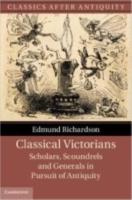
CUP (2013) h/b 227pp £54.99 (ISBN 9781107026773)
From the title—or especially the subtitle—one might expect to be led on a romp through the lives of the many maverick, even picaresque characters who were involved directly or indirectly with the classics in the Victorian era: sed caveat lector! This book throughout shows its genesis from a PhD thesis (supervised by S. Goldhill), and is part of a series that (say the General Editors) ‘aims to unsettle, provoke debate and, above all, stimulate a re-evaluation of assumptions about the relationship between Greek and Roman classical pasts and modern history’. But sometimes one forgets that for almost anyone who was fully educated in those days, his (rarely her) education was, in fact, likely to be classical—so almost any maverick of note had probably studied Greek and Latin at school, if not at university. And although Sir Richard Jebb—no maverick he—makes an appearance, his role is relatively minor.
Actual case studies here are not very many: there is an opium addict (dead at 30); a wife-murdering headmaster, who rather luckily escaped the noose; a debt-ridden burlesque-writer (dead at 32), and—incomparably the most interesting—Samuel Butler, author of The Authoress of the Odyssey, Erewhon, and The Way of All Flesh. The ‘Greek Play’ bishops have cameo roles (but Blomfield was a scholar of repute, as Housman knew), and an Appendix gives lists of bishops in 1800 and 1865 ‘born into the elite’, who ‘advanced through patronage’, who ‘gained advantage from theological writings’ and who ‘gained advantage from classical learning’ (only 3 of these are listed): a similar, and longer list does much the same for archdeacons in 1840. The generals of the subtitle are the Lords Cardigan and Raglan, who so distinguished themselves in the Crimean War: a French officer amusingly compared the latter to Agamemnon, Cardigan to Achilles and Sebastopol to Troy: only the wooden horse was lacking.
Samuel Butler has been the subject of a full-length biography, by Peter Raby (1991), which is inexcusably omitted from R.’s bibliography. He was, in short, a wealthy and dedicated enfant terrible whose targets lay everywhere—the Bible, Darwin, Shakespeare, Homer. Butler’s intention in The Authoress of the Odyssey was largely, but perhaps not entirely, to entertain, while delivering a Shavian attack on (one) Victorian concept of Homer, patriarchal and blind, by replacing him with Nausicaa; R. writes about this episode with markedly more verve, point, and interest (in my view) than elsewhere, and the book itself can still be read with enjoyment today. There are several distinctly interesting quotations from Andrew Amos’s Four Lectures, and, among other notable figures, the familiar and rotund figure of Oscar Browning makes an appearance (with the well-known illustration of him with Lord Curzon).
Whether R. achieves the lofty aims of the General Editors may be doubted; and a more balanced view of the Victorians and the classics can be found in Richard Jenkyns’s superb The Victorians and Ancient Greece (1980). As hinted at above, the book is well, and amusingly, illustrated: but, to repeat, although most mavericks may have known their classics, not all classicists were mavericks. One may hope that a paperback edition will be much less expensive.
Colin Leach
